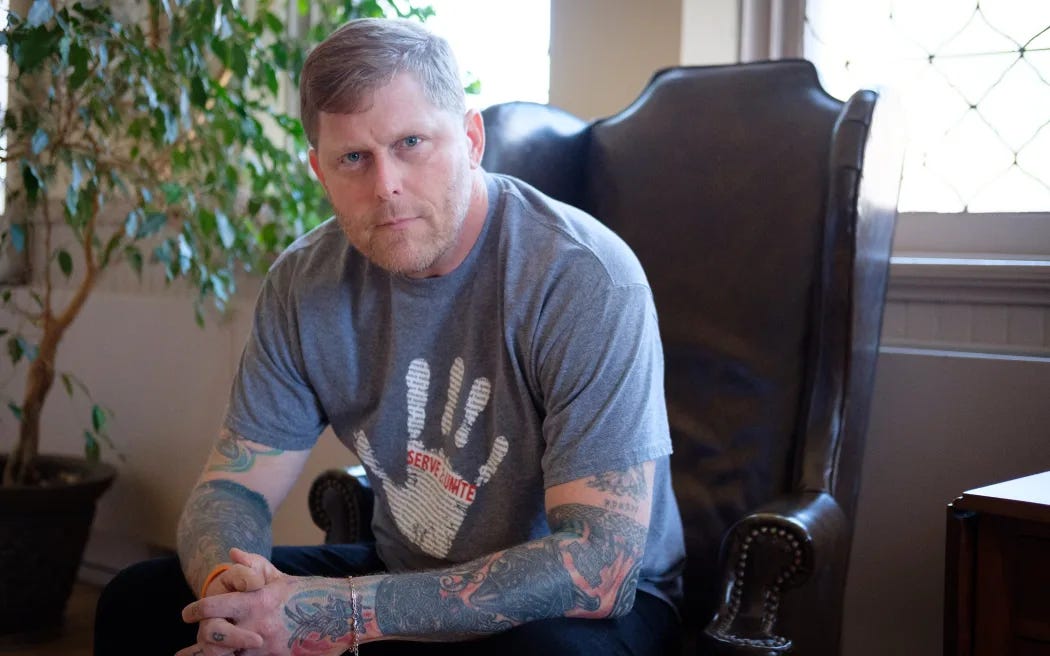How a One-Time Neo-Nazi Flipped Off His Past
"When she asked me about my tattoo, I told her it was nothin.' I looked down, feeling about six inches tall. When I looked back up, our eyes met, and she said: ‘That's not who you are.'"
By Michael Golden
It started when Arno Michaelis was a kid, bullying other kids on the school bus. Then he added vandalism and breaking and entering. His father was an alcoholic, and Arno says that he himself started drinking at age 14:
“That was like gas on a fire. And I got into the punk rock scene, which I still love punk rock. I don't want to make it sound like punk rock is some kind of gateway drug to white nationalism. But to me, in the mid-80s, punk rock was about breaking things and pissing people off and repulsing society. And that's what really attracted me to it, was the idea of shocking people.”
When I interviewed Arno earlier this month, he was forthright about his past. He still lives in Milwaukee, Wisconsin, where he grew up and where he grew into one of the leaders of the Neo-Nazi movement:
“The themes of those punk lyrics were literally the same as the themes of the Third Reich, in that it was blood and soil and race and nation. And this music told me that I was a white warrior fighting for my people who were in danger of extinction at the hands of this thousands of years Jewish plot to kill all the white people on the planet Earth. Now to any thinking person that should sound absolutely ridiculous, because it is. But to a 16-year-old alcoholic who has never processed his childhood trauma in a healthy way and has an addiction to shocking people and lashing out, it was literally music to my ears.”
Arno didn’t hate Jews as a kid. He had lot of friends and went to plenty of bar and bat mitzvahs. He says they were fun. But by the time he was 16, he was beating up Jews and other minorities. As he looks back now, he says that in his mind, pointing his hate at them was a way to validate all of the street violence and “drunken hooliganism” he was doing anyway.
“Basically, we would just get drunk, go out on the streets and look for reasons to get in fights. If we had an opportunity to attack someone who didn't look like us, we did. If we thought someone was gay, if we thought they were Jewish, they were attacked.”
Though he says his parents loved him, his father’s alcoholism put pressure on the family. They were living beyond their means, and his mother bore the brunt of it working extra jobs to pay the rent. Arno says that watching his mother suffer was what initially caused him to lash out. It just got worse and worse, and eventually he was lead singer for a hate band, complete with a swastika tattoo on his middle finger.
This went on for seven years, until Arno was about 24. That’s when two factors led him out of the movement: Exhaustion, and the kindness of others — others who were not white.
“Hate is exhausting in the same way that heroin is exhausting, in the same way that alcohol is exhausting, the same way that crack cocaine is exhausting. When you're in the throes of it, you have this rush and you feel high and you feel feel good, but then when it wears off, you're just miserable and you need more of it as soon as you can.”
One day while ordering food at a McDonalds, a Black woman behind the counter smiled at him. Then she noticed the tattoo on his finger, and asked him what it was.
“Y’know, all I could do is look down at my steel-toed skinhead boots. And I was 6'3 at the time. I was about a foot taller than her, and I felt six inches high when she asked me that. I told her it was nothin.’ She waited until I looked up again, and when our eyes met, she said: ‘That's not who you are. You're a better person than that.’”
Arno scurried out with his Big Mac and then got drunk to numb the shame. Then he went out and beat someone up.
It took Arno a while to really remove himself from all the hate. He still can’t believe how the people in his life were reacting to his violent behavior.
“The thing that I experienced as a white nationalist was that those people I claimed to hate — treated me with kindness. And I was extremely fortunate that throughout that seven-year period, there were people like a Jewish boss, a lesbian supervisor, African-American, Latino, and Asian coworkers who treated me with kindness when I least deserved it, but when I needed it the most.”
Arno left white nationalism for good in 1994. Ever since, he has been writing, speaking, counseling and doing interventions. His work is based on all of that behavior he regrets. Though he became a Buddhist, he has many Jewish friends and says that he loves Jewish culture. Still, he knows that his time is not done on the road to redemption.
“Self-forgiveness is a journey I'm going to be on for the rest of my life. I don't take any harm that I've done lightly. And I've done a lot of it. And the scope of the harm that I've done is hard to even get your head around, especially considering the band. Because that music I made is still out there, and I'm literally screaming at people to go and murder each other because of skin color and religion and things like that. And I can't take that back. So every day I have to live with the truth of the harm that I've done. And if I let that consume me, I'm not going to be much good to help other people.”
Arno Michaelis says that all of this stuff comes full circle when he’s counseling young people.
“When I'm talking to ‘Joe Pissed Off White Kid’ now, I can help him through that process as well. I'm not like preaching to him from the top of some mountain as like this enlightened, perfect being. I'm a fellow practitioner who's going to take his hand and walk that path with him. And honestly, he's helping me as much as I'm helping him. I need someone to help as part of my process.”
At the beginning of our conversation, I told Arno that I would be less than honest if I didn't say I felt a little awkward talking to him. Not just as a Jew, but as the head of a publication with 20 Jewish writers.
But I also told him that I was curious about his metamorphosis — that I wanted to know how this stuff happens. I want to know why — and how — it can change in people.
Arno has written two books about his experiences, the first a memoir entitled Life After Hate. He works with a few organizations, including Serve2Unite, which was created in the wake of the 2012 shooting of the Sikh Temple of Wisconsin.
I wrote an article a month ago about what it’s like to be Jewish, and how I hope JEWDICIOUS will share that sensibility with a wider audience. When people get to know us, they largely like us. And vice versa. I want more of that!
At the same time, I think it’s important for us to bring you stories like Arno’s. This is not to say that I am unrealistically sanguine about the macro effect that someone like him can have on turning the tide of hate that’s been boiling all over the world. But people need to know that within each and every individual, this kind of conversion is possible.
Hope begets hope.
MICHAEL GOLDEN is the Editor-In-Chief of JEWDICIOUS and creator of The Golden Mean.
From navigating the nuances of family and relationships to unpacking history and politics to finding the human angle on sports and entertainment — plus our unsparing take on what’s happening in the Jewish world — the canvas at JEWDICIOUS is limitless!






These stories are important to tell. As an Israeli, I am moved by stories of ex-Islamists who wean themselves from the Jew-hatred they were raised on. I hope that such stories will be numerous in the post-Hamas era and that it will be possible to de-Hamasify the population there.
Whilst I am glad he stopped being a douchebag, I fail to give much credit to someone who escaped the consequences of his actions. Assaulting people randomly is a crime. Premeditated assault is a crime. Did he turn himself into the police and serve prison time to atone for his actions? I doubt it. It's easy to play the "I am better now" card, but his victims deserve real justice as in his receiving actual punishment.